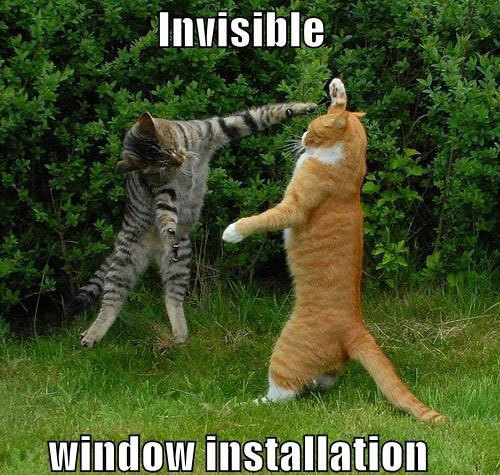Please enjoy this cat meme. Below it is my draft.
It is the genre of television we love to hate, and admittedly hate to love. Whether you have accepted America’s fascination with the genre as inevitable, or whether you remain in denial, clinging on to the hope that your fellow citizens have “classier taste”, reality television has still managed to captivate millions of viewers worldwide multiple nights a week (sometimes even multiple times a day). With the most recent season finale of popular dating show The Bachelor raking in 10.8 million views in a single night (a 14 percent jump from last season’s viewer count), and popular singing competition, American Idol pulling in a whopping 21.6 million during it’s 2012 season finale, you can’t deny that a good portion of America has become captivated with reality TV.
 |
| What are you doing cats? You're not window repair men! http://kajacana.tumblr.com/ |
It is the genre of television we love to hate, and admittedly hate to love. Whether you have accepted America’s fascination with the genre as inevitable, or whether you remain in denial, clinging on to the hope that your fellow citizens have “classier taste”, reality television has still managed to captivate millions of viewers worldwide multiple nights a week (sometimes even multiple times a day). With the most recent season finale of popular dating show The Bachelor raking in 10.8 million views in a single night (a 14 percent jump from last season’s viewer count), and popular singing competition, American Idol pulling in a whopping 21.6 million during it’s 2012 season finale, you can’t deny that a good portion of America has become captivated with reality TV.
Critics,
bloggers, journalists, and writers alike have pored over this obsession the
American people have developed with this often-absurd genre. Andy Dehnart,
creator and editor of the popular reality TV blog Reality Blurred, describes the genre as “a subset of nonfiction
TV”, or “television that involves real people”. Dehnart goes on to clarify that
“nonfiction TV is not reality TV”, but rather reality TV is the “dramatic,
soap-opera like” brother of nonfiction TV. In their article Reality Bites, Edwin Stepp and Bill
Welch note the conflict between the genre being seen as “exploitative and
salacious” versus “exciting and fun”. Most critics, like Stepp and Welch, tend
to side with the “salacious” argument, focusing on the negative social
implications the genre might instill in it’s viewers, such as the ethics of
“frankenbiting” (an edited reality show snippet that splices
together several disparate strands of an interview, or even multiple
interviews, into a single clip), gender role disputes, elitism, and stereotypes
(just to name a few). Kaitlin Chapman, contributor to the website A Critical Guide to Reality TV, sums up
the overall critical opinion when she states that “it [reality TV] doesn’t
provide any intellectualism for our viewers today and doesn’t provide any
stimulus for our culture either”.
This wouldn’t be the
first time that critics found fault with society’s entertainment choices. THIS IS WHERE I TALK ABOUT THE DISAPPROVAL OF SHAKESPEARE.
UNFORTUNATLY I HAVEN’T RECEIVED MY BOOK FROM ILL YET, SO THIS WILL HAVE TO WAIT
UNTIL THEN. Sad day :(
I argue that reality TV
does provide “intellectualism”, as well as “stimulus”, for our culture. The
problem isn’t wholly in reality TV itself, but rather in the lens with which we
as viewers and ‘critics’ are choosing to view the genre, as well. I believe
that if we view reality TV as a derivative of Shakespearean theater (with maybe
a little less class), paying attention to its use of editing and controlled
settings, casting methods, characterization, plot formation, and its
representation of the touchy subjects we can shed reality TV in a new light.
This takes away from some of the superficiality that we can't seem to shake in
reality TV and begin to see how this genre, which won’t be leaving us any time
soon, can benefit our culture and provide the “intellectualism” we all secretly
want it to provide.
Move 1: To
view reality TV in correlation with Shakespearean theater, we must fist
understand what constitutes theater, specifically Shakespearian theater, as worthwhile
entertainment.
Move 2: These aforementioned elements to Shakespeare have
influenced and appeared in media and entertainment across the ages.
Move 3: As defined by the New Oxford American Dictionary, reality
television is a television program in which real people are continuously
filmed, designed to be entertaining rather than informative. The genre consists
of many different sub categories such as dating shows, documentary style shows,
and game shows, the first reality show being the well-known hidden camera show
that debuted in 1948: Candid Camera.
Since Candid Camera, the reality TV
genre has blossomed into what Stepp calls a “major media gold mine”, including
subgenres of dating type shows, game/competitions shows, and documentary style
reality shows. To make reality TV
Move 4: The issues with the genre arise in the lack of
“intellectualism” provided in the situations created by the shows’ producers.
Most of the complaints on forum boards or comment sections seem to center
around the fact that that reality TV tends to push the envelope in topics like
sex, race and gender. They draw on the fact that by watching people like on Jersey Shore or Survivor make selfish, heartless choices the viewer receives a
sense of validation for performing such actions or thinking such thoughts
themselves. It’s the same feeling that occurs when we feel empathy towards
Macbeth or Iago, even, for being driven by fallacies that every human suffers
from: power, greed, lust, revenge- all desires for self-satisfaction. In a sense, those against reality television
fear that by showing thoughtless or even malicious acts of self-interest, the
viewers at home might begin to view those actions as acceptable.
Move 5:
Move 6:
Move 7:
No comments:
Post a Comment